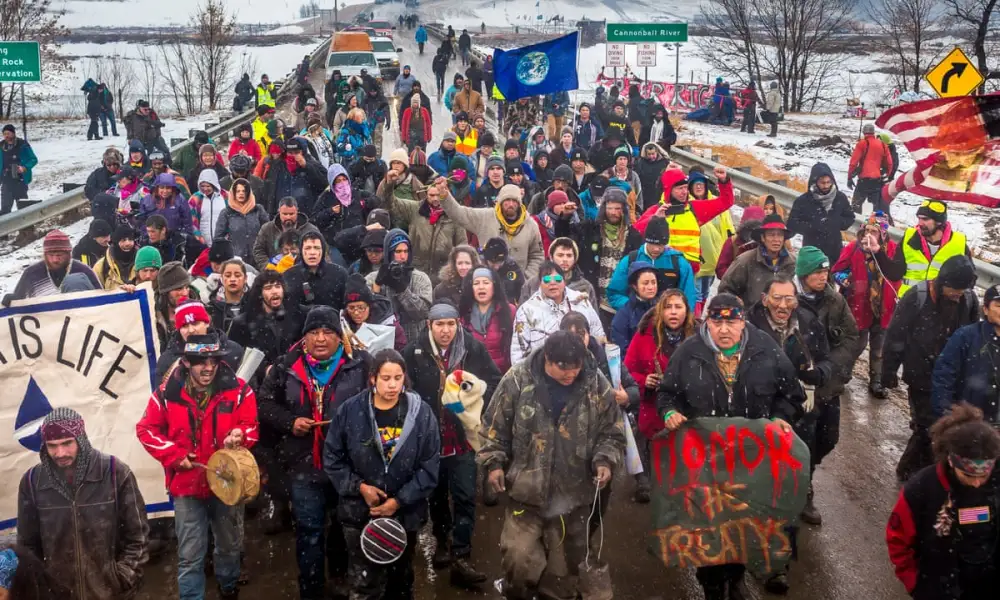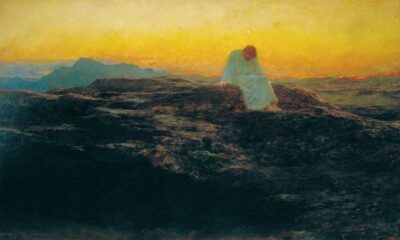Legislative
AOC says she had ‘awakening’ about her indigenous heritage at Standing Rock in 2016

Rep. Alexandria Ocasio-Cortez said she experienced an “awakening” and got in touch with her indigenous ancestry in 2016, while demonstrating against the Dakota Access Pipeline at the Standing Rock Indian Reservation.
During a lengthy Instagram story Q&A session Saturday, the progressive lawmaker spoke for roughly three minutes about people native to the Caribbean, known as Taíno, and the Americas, stressing that many Taíno ways are still alive and have not been entirely wiped out by European colonization.
“I really, really feel you, and understand you on this,” AOC says in the video, in response to an unnamed self-identified Boricua, or Puerto Rican, Bronx resident who said they “want to learn more” about their Taino ancestral traditions. “In fact, I feel like one of the things that first started awakening and connecting me deeply to my indigenous heritage was connecting with the Lakota Sioux at Standing Rock.”
Ocasio-Cortez expressed gratitude toward various indigenous people for welcoming her when she protested against the controversial Dakota Access oil pipeline in North Dakota.
“When I was at Standing Rock surrounded by Native people, Lakota Sioux, Cherokee, all people coming together, and I looked around, it really just clicked that this is us, and the grace that they extended to say, ‘No, you are a relative,’ was really formative for me,” she recalled. “And while we may not be — and come from — the same exact lineage, there is a commonality to that ancestry.”
“And it’s important for us to recognize that we were raised, and we were told growing up, that we were extinct, that Taíno don’t exist, and it’s really important for Puerto Ricans to understand that that narrative is being challenged right now,” she added.
AOC emphasized the staying power of the Taíno people. “Our creation story still exists, our words still exist, our mythology still exists, you may even engage in Taíno practices now,” she said, referencing plant-based medicine.
AOC cited the Taíno word hurakán — meaning “God of the storm” — as an example of a culture creation that “impacted the entire English- and Spanish-speaking world” by creating the word hurricane.
AOC also noted that Puerto Rican customs originated in West Africa. “One more thing that’s important to note is that our culture isn’t just Taíno; it’s also Yoruba,” she explained. “When our ancestors were brought and enslaved to the island, they also brought Yoruba culture.”
Ocasio-Cortez — the Bronx-born daughter of a father from the borough and mother from Puerto Rico — has also previously spoken about her Sephardic Jewish heritage.
“A very, very long time ago, generations and generations ago, my family consisted of Sephardic Jews,” the Catholic then-Congressional candidate told the audience at the Jackson Heights Jewish Center in December 2018.
“The story goes, during the Spanish Inquisition, so many people were forced to convert on the exterior to Catholicism, but on the interior continued to practice their faith,” AOC explained at the time. “And some of those people landed in Puerto Rico, and some of those people decided to flee up into the mountains.”
Terry A. Hurlbut has been a student of politics, philosophy, and science for more than 35 years. He is a graduate of Yale College and has served as a physician-level laboratory administrator in a 250-bed community hospital. He also is a serious student of the Bible, is conversant in its two primary original languages, and has followed the creation-science movement closely since 1993.
-

 Civilization3 days ago
Civilization3 days agoWhy Europe Shouldn’t Be Upset at Trump’s Venezuelan Actions
-

 Executive4 days ago
Executive4 days agoHow Relaxed COVID-Era Rules Fueled Minnesota’s Biggest Scam
-

 Constitution5 days ago
Constitution5 days agoTrump, Canada, and the Constitutional Problem Beneath the Bridge
-

 Christianity Today3 days ago
Christianity Today3 days agoSurprising Revival: Gen Z Men & Highly Educated Lead Return to Religion
-

 Civilization4 days ago
Civilization4 days agoThe End of Purple States and Competitive Districts
-

 Executive3 days ago
Executive3 days agoWaste of the Day: Can You Hear Me Now?
-

 Executive4 days ago
Executive4 days agoWaste of the Day: States Spent Welfare in “Crazy Ways”
-

 Guest Columns5 days ago
Guest Columns5 days agoWhy We Need Lent


